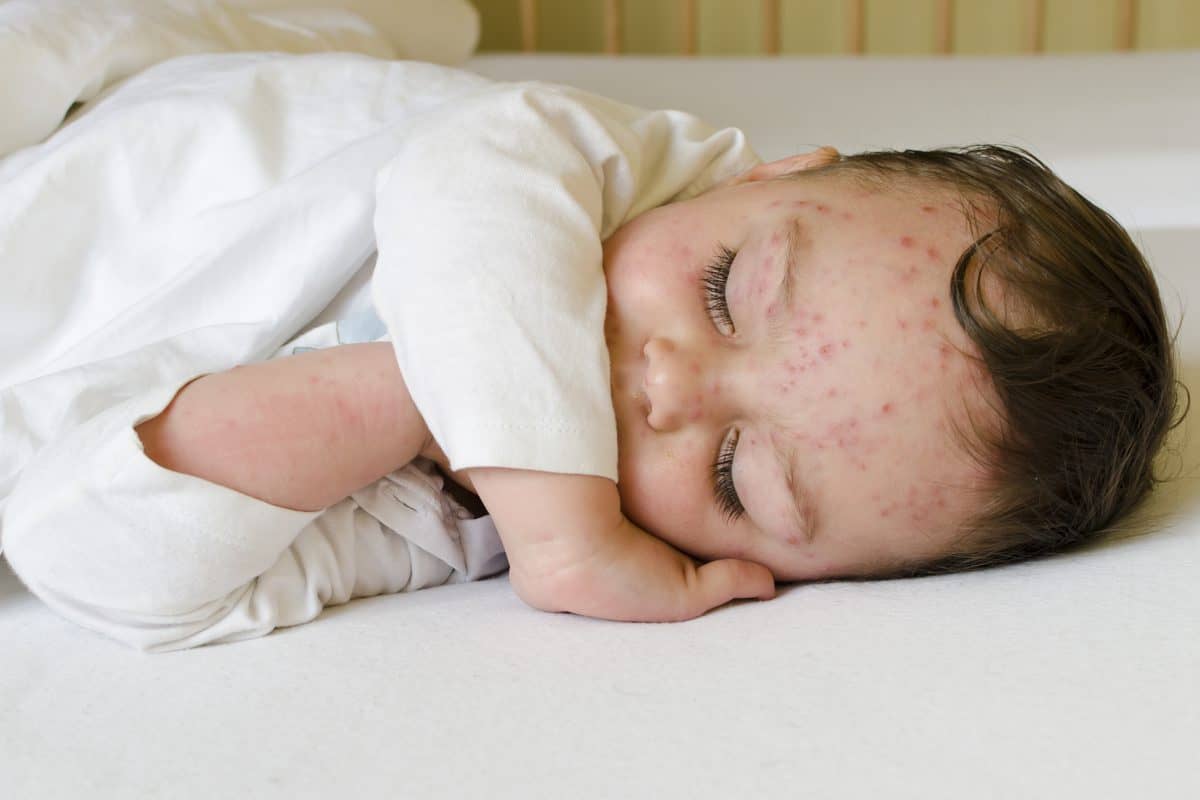Tag: Childhood Vaccinations
ESSENTIAL CHICKENPOX VACCINE FACTS:
- The chickenpox vaccine is not currently given by the NHS, but is part of the childhood vaccination schedule in other countries
- Chickenpox is a highly contagious infection caused by the varicella zoster virus
- In the UK, it mostly affects children
- It can be itchy and uncomfortable, can leave scars, and can sometimes cause severe disease – adults may suffer more serious symptoms, including pneumonia
- Chickenpox is spread by inhaling droplets coughed up by people infected with the virus
- People with chickenpox become contagious about 2 days before the appearance of the rash, which can make it difficult to avoid infection
- The chickenpox vaccine (varicella vaccine) can be administered from the age of twelve months onwards
- Two doses of vaccine are needed, with a 4 week gap between doses
- If your child is receiving the MMR vaccination or a Yellow Fever vaccine, the varicella vaccination must either be given on the same day, or 4 weeks later
HOW TO BOOK A VACCINATION APPOINTMENT
Fleet Street Clinic is dedicated to maintaining a good supply of the chickenpox vaccine.
Our private chickenpox vaccine service is undertaken by doctors and nurses with long experience of vaccinating children. Our family friendly clinic is sympathetic to parents’ needs and concerns, and we welcome any vaccine-related queries. We operate a Saturday vaccination clinic once a month, the next will be held on Saturday April 8th.
To book your chickenpox vaccination for yourself or your child, you can book online now.
The summer holidays will fly by and be over as quickly as they began, much to your relief, but probably the disappointment of your kids! Unfortunately, alongside the general back to school chaos, September also brings with it the start of the flu season.
Flu season not only means that people have to take time off of work due to being ill themselves, but parents often have to take time off work to look after their children who have the flu, because schools are rife with superspreaders. It seems that the best solution to the frustrating effects of the flu on school and parenting life is to nip it in the bud early enough in the season for immunity to make a significant difference.
This is where the flu vaccine comes in.
The flu vaccine comes in two forms, the traditional syringe-administered jab, and a nasal spray vaccine. While the nasal spray vaccine may be the preferred administration tactic for parents of children who don’t like needles, supply issues have resulted in limited availability, and it may still be worth considering the alternative.
When might the jab be preferable?
The nasal spray vaccine is protective and an excellent choice, but is not suitable for everyone. It is a live vaccine, and so cannot be administered to children who are immunocompromised or who live with anyone who may be immunocompromised. It is also unsuitable for anyone with bad asthma, since it may trigger an attack. The injected vaccine is not a live vaccine and is an obvious solution for a lot of people.
The nasal spray vaccine contains traces of gelatine and egg, and so may be unsuitable for vegetarians, vegans, Muslims or those with a severe egg allergy. There is a cell-culture based injectable vaccine that is egg-free, which may be a more acceptable alternative.
The nasal spray vaccine can only be given from age two onwards. However, if there is a special reason for needing to vaccinate your child at a younger age than this, the standard injectable vaccine can be given from the age of 6 months. (The best way to protect babies younger than this is by vaccinating mums during pregnancy.)
For the past three winters, the nasal spray vaccine has been in limited supply. It has not been available privately but only through the NHS, and supply issues have resulted in extended delays. By contrast, injected vaccines have been available reliably from September onwards.
A well-timed dose of the injected vaccine, early in the season, may be a better option than the uncertainty of a delayed dose.
At the Fleet Street Clinic, we have been happy to offer the nasal spray vaccine previously but having been unable to obtain reliable supplies for the past three years, we will not be offering it this season.
If you decide to book the injected flu vaccine for your child this winter, you can rely on guaranteed supplies as well as our expertise in vaccinating babies and children of all ages.
__________________________
24/25 Winter Flu Vaccination Pricing:
Cell-Based Quadrivalent Flu Jab – £42 – Suitable from 2 years
Standard Quadrivalent Flu Jab – £15 (while stocks last) – Suitable from 6 months old
Book Your Flu Jab Online Today
Respiratory Syncytial Virus (RSV) is a common and highly contagious virus that primarily affects the respiratory tract, causing significant illness, particularly in infants.
It is present year-round but peaks during the winter months, and spreads through droplets from coughs and sneezes or via contact with contaminated surfaces. RSV is a virus, so antibiotics are not an effective treatment.
Each year, RSV poses a substantial health risk to infants and older adults worldwide.
In the UK, RSV accounts for approximately 33,500 hospitalisations annually in children aged 5 and under, resulting in 20 to 30 deaths per year. 75-80% of hospitalisations due to RSV happened during the first 6 months of life.
Is there a suitable RSV vaccine for pregnant woman?
Abrysvo is a recombinant vaccine for the prevention of severe lower respiratory tract disease caused by RSV in infants up to six months old. It is the only maternal RSV immunisation given to the pregnant woman between 28 – 36 weeks of pregnancy to help protect newborns. It can also be used for older adults over the age of 60 years, in preventing RSV that can lead to breathing difficulties and pneumonia.
Maternal vaccination involves administering vaccines to pregnant women to protect their newborns through the transfer of antibodies. This approach has been effectively used for diseases like whooping cough.
Vaccinating pregnant women against RSV provides passive immunity to their babies, safeguarding them against RSV until they can receive their own vaccines. The RSV vaccine should ideally be given at least 2 weeks apart from the whooping cough vaccine.
In the UK, the Joint Committee on Vaccination and Immunisation (JCVI) has assessed the impact of RSV and now recommends vaccination to protect vulnerable groups, including infants and older adults with the aim of reducing the incidence of RSV-related illnesses among infants, ultimately reducing RSV-related morbidity.
At Fleet Street Clinic, we can offer private RSV vaccination to protect you and your baby, ahead of the NHS roll out.
Abrysvo is an inactivated vaccine and only requires a single dose for protection.
Price: £296
Please contact our reception team to book by phone, +44 20 7353 5678 or by emailing info@fleetstreetclinic.com
RELATED SERVICES AVAILABLE AT FLEET ST. CLINIC
What to do if you think your child has measles and when to keep them off school.
Measles cases are increasing throughout England, particularly among children. This highly contagious infection can lead to severe complications for some individuals.
Since there is no specific medical treatment for measles, obtaining vaccination is crucial for the best defence against serious illness. The measles, mumps, and rubella (MMR) vaccine is part of routine childhood vaccinations, meaning most children are already immunised against measles.
If your child has received both doses of the vaccine, it is unlikely that they will contract the virus.
Here, we’ll provide everything you need to know about measles, from ensuring your child’s vaccination to knowing when to keep them away from school.
What are the symptoms of measles?
Measles usually starts with cold-like symptoms, followed by a rash a few days later. Some people may also get small spots in their mouth.
Symptoms of measles usually start to appear 7-14 days after you become infected, which include:
- Runny/blocked nose
- Sneezing
- High temperature
- Sore, red eyes that may be sensitive to light
- Sore throat
- White spots inside the mouth
What does a measles rash look like?
Measles usually begins as flat red spots that appear on the face at the hairline and spread downward to the neck, body, arms, legs, and feet. Small, raised bumps may also appear on top of the flat red spots. The spots may become joined together as they spread from the head to the rest of the body.
What should you do if you think your child has measles?
If you suspect that you or your child might have measles, it’s important to request an immediate GP appointment or seek assistance from NHS 111.
Before visiting the GP or any healthcare facility, make sure to call ahead for guidance.
In the event of a measles diagnosis for your child by a doctor, it is advisable for them to refrain from attending nursery or school for a minimum of 4 days from the onset of the rash. Additionally, they should steer clear of close interactions with infants and individuals who are pregnant or have compromised immune systems.
What is the best way to protect against measles?
The best protection against measles for children and adults is to get both doses of the MMR vaccine.
MMR vaccination is available at Fleet Street Clinic for children and adults who would like catch-up on doses. If you or your child haven’t been vaccinated yet, or have an unfinished course of vaccines, either book an appointment online or contact our reception team on +44 20 7353 5678 to book an appointment.
We can usually accommodate same day appointments.
Alternatively, children receive the vaccine at no cost on the NHS at 12 months and then a second dose at 3 years and 4 months. You may find the NHS vaccination service has a longer wait time that us.
If you prefer a version of the MMR vaccine without pork products, please get in touch, explaining your preference and we will do our best to accommodate. It’s important to note that we would be ordering this product specially for you, so there may be a longer wait time for delivery and prepayment will be required. Either call our reception team on +44 20 7353 5678 or email info@fleetstreetclinic.com
Cold-like symptoms can be an early sign of measles. Should you still send your child to school?
If your child has been vaccinated, it’s very unlikely that they have measles. Check if they have a high temperature or a fever, and if not, we’d advise it’s fine to send your child to school.
Keep an eye on their symptoms and adapt accordingly if they worsen.
When should you keep your child off school or nursery and how long for?
If your child has measles, they should stay off nursery or school for at least 4 days from when the rash first appears and avoid close contact with babies and anyone who is pregnant or has a weakened immune system.
The school will let you know if your child has been in contact with someone who has measles and advise what you need to do.
They may advise people who are more susceptible to contracting the virus, such as unvaccinated siblings to stay away from school for the incubation period to be on the safe side.
The incubation period is the length of time it can take to develop the illness after being in contact with someone with measles. For measles, the incubation period can be up to 21 days.
Anyone, child or adult, who has been vaccinated is unlikely to be considered susceptible.
If you’re not sure whether your child is due a vaccination or has missed a vaccination, you can check their Red Book or contact your registered GP practice for confirmation.
If your child has missed their first or second dose of the MMR vaccine, we’d advise you book an appointment for catch up vaccines. You can book an appointment online.
Should you keep your child off school if another pupil has been diagnosed with measles?
Most children will be protected against measles and there is no need to keep your child off school if they have had both their MMR vaccinations.
Your school will let you know if your child has been in contact with someone with confirmed measles and will advise what the next steps are.
Can I still get my child vaccinated even if they’re older?
Yes. The MMR vaccine is suitable for adults and children, therefore, anyone who has not had 2 doses of the MMR vaccine can book an appointment for catch up vaccinations.
It’s best to have vaccines on time, but you can still catch up on most vaccines if you miss them. Two doses of the vaccine are needed to ensure full protection.
RELATED SERVICES AVAILABLE AT FLEET ST. CLINIC
Related Blogs:
Measles outbreak & isolation warning
In September 2021, Public Health England released new rules surrounding the timing of BCG vaccination, increasing the minimum age of vaccination to 28 days. This has been implemented in line with a pilot disease screening programme that tests eligible newborns for Severe Combined Immunodeficiency (SCID), the outcome of which becomes available by the time the baby is 6 weeks old. It is important that we wait for the result of this test before giving the BCG vaccine.
What is SCID screening?
All newborn babies in the UK are currently offered blood spot screening (heel prick test) that looks for 9 rare diseases, including sickle cell and cystic fibrosis. The NHS is considering introducing an additional test for Severe Immunodeficiency (SCID), a name given to a group of rare, inherited disorders that cause major abnormalities in the immune system. Affected infants have an increased risk of life-threatening infections and will normally become severely unwell in the first few months of life. Without treatment they will rarely live past their first birthday. About 14 babies a year are born in England with SCID.
The evaluation of this testing, which began on 6th September 2021, is taking place in 6 areas across England and will cover around 60% of new born babies. It is running alongside the existing blood spot screening and the intention is to roll it out nationally once the 2 year evaluation has been made.
Why does this affect the BCG vaccination?
Bacillus Calmette-Guérin (BCG) is a live attenuated vaccine that can cause problems if given to an immunocompromised person. Treatment for SCID is more complicated if the child has received the BCG vaccine, so it is important that if your child has been tested. We wait for a negative result before vaccinating.
What we need from you:
If your child was included in the SCID programme, you will need to provide a letter that confirms the negative result of screening.
If your child was born outside of the programme areas and therefore, not included in the SCID programme, we will need to see a letter confirming this.
In either case, please bring the letter with you to your appointment, as well as your child’s vaccination book.
Nb. If your child was born before 1st September 2021, before the programme was introduced, no letter will be needed.
For more information on:
Other Childhood Vaccinations
Some infections can harm your baby if you catch them during pregnancy. Research suggests that the flu, in particular strains such as H1N1 (swine flu), can significantly increase the risk of complications to expecting mothers and their unborn babies.
Vaccinating expecting mothers against flu or before pregnancy can provide the newborn baby with significant ‘passive’ protection – which can last several weeks after birth. This is important because babies cannot be vaccinated themselves until they are 6 months old. So, a mother’s vaccination is strongly advised.
Fleet Street Clinic are urging all the mums-to-be to have the vaccine. The Quadrivalent Flu Jab can be safely given at any point during pregnancy.
Pregnant women are less able to fight off infections and therefore more likely to be seriously ill if they contract the flu virus. Pregnant women are at risk of complications from the flu at any stage of pregnancy. So therefore, it is important for those expecting to get their flu jab as early as possible.
If you are currently planning your pregnancy, it would be sensible to consider getting your flu jab prior to becoming pregnant.
The flu vaccine can safely be given to pregnant women at the same time as the whooping cough vaccine. You can have the whooping cough vaccine from 16 weeks onwards.
The vaccine is inactivated, and cannot cause flu itself.
Having the flu vaccine is the best protection.
If you are interested in booking flu vaccinations for your staff, visit flujabs.org for more information and to get a quote.
Urgent polio boosters advised for London children
UK Health Security Agency (UKHSA) has announced that all children aged 1-9 years regardless of previous immunisation status are recommended a polio vaccine booster from all London boroughs.
The virus, which can cause paralysis, has been found 116 times in London’s waste water between February and July this year.
In the UK, the overall risk of paralytic polio is considered low because most people are protected from this by vaccination. However, due to the recent discovery of type 2 vaccine-derived poliovirus in sewage in multiple locations in London, the Joint Committee on Vaccination and Immunisation (JCVI) have advised that booster vaccinations in all children aged 1-9 years is an appropriate course of action.
The UKHSA says most of the samples detected are the safe vaccine form of polio, but “a few” have mutated enough to be considered dangerous.
Parents should seek the polio vaccine booster as soon as possible – even if their child is up-to-date with their childhood vaccinations.
The aim is two-fold; to ensure a high level of protection from polio paralysis and help reduce further spread of the polio virus across London and beyond.
Booster Polio Vaccinations at Fleet Street Clinic
We offer two vaccinations in-clinic that offer protection from Polio:
Revaxis Vaccine: Suitable for children from 6 years and above
Protects against: Diphtheria, Tetanus, Polio
Cost: £49 + £28 appointment fee
Call to book
Repevax Vaccine: Suitable for children from 3 years and above
Protects against: Diphtheria, Tetanus, Polio & Whooping Cough
Cost: £98 + £28 appointment fee
Call to book
Both of these vaccinations are inactivated, and given by injection. They are both licensed as booster doses, and are not intended for primary immunisation.
More information on the Polio vaccines available at Fleet Street Clinic, click here.
Primary Polio Vaccination
Unfortunately, we do not offer the infant/ baby vaccination for Polio – in the UK this would be the Infanrix-Hexa, the 6-in-1 vaccine. We have no suitable vaccination for children under the age of 3, or for those requiring their primary immunisation against Polio.
Please contact your NHS doctor or an alternative provider to see if they can help you further.
Dr Vanessa Saliba, Consultant Epidemiologist at UKHSA, said:
“It is vital parents ensure their children are fully vaccinated for their age. Following JCVI advice all children aged 1 to 9 years in London need to have a dose of polio vaccine now – whether it’s an extra booster dose or just to catch up with their routine vaccinations. It will ensure a high level of protection from paralysis. This may also help stop the virus spreading further.”
______________________
More information on Polio and the emerging London findings:
What is Polio?
Polio is a serious viral infection that is transmitted through the stool’s of an infected person through contaminated water, food or surfaces. It can cause unpleasant flu-like symptoms and in severe cases, cause paralysis.
What are the symptoms of Polio?
The majority of people with the infection have no symptoms but some feel as if they have the flu, with:
- high temperature
- sore throat
- headache
- abdominal pain
- sickness
In severe cases of polio, the virus can attack the nerves in the spine and brain which can cause paralysis. In some cases, it can cause persistent or lifelong difficulties and even be life-threatening.
Where has Polio been found?
According to the UKHSA statement, in addition to the findings earlier this year of type 2 poliovirus (PV2) collected from the Beckton sewage treatment works, further upstream sampling undertaken by the UK Health Security Agency (UKHSA) and the Medicines and Healthcare products Regulatory Agency (MHRA) has now identified at least one positive sample of the poliovirus, currently present in parts of the following boroughs:
- Barnet
- Brent
- Camden
- Enfield
- Hackney
- Haringey
- Islington
- Waltham Forest
The sampling has also detected the virus in lower concentrations and frequency in areas adjacent to the Beckton catchment area to the South (immediately below the Thames) and to the east of Beckton. However, it is not clear whether the virus has established itself in these areas or if the detections are due to people from the affected area visiting these neighbouring areas.
How many cases of Polio have been identified?
To date, again based on the UKHSA statement, ‘a total of 116 PV2 isolates have been identified in 19 sewage samples collected in London between 8 February and 5 July this year’.
A further 15 sites in London will start sewage sampling in mid-August, and 10 to 15 sites will be stood up nationally to determine if poliovirus is spreading outside of London.
To book your child’s Polio Booster Vaccination, call +44 20 7353 5678 today.
Measles: Don’t Get Caught Out
Cases of measles have risen rapidly in recent months in Europe, United Kingdom but most recently, Brazil. Measles is a highly contagious virus with potential for serious complications. It is a serious viral infection, spread by airborne droplets and is highly infectious. It is recommended that two doses of the measles vaccination should be given to individuals to prevent infection. Although many countries include the vaccination as part of the routine childhood immunisation schedule, international travellers should check that they are immune before departure.
Most UK citizens will have immunity in one of two ways:
Natural immunity can be assumed for those born before 1970, where individuals would have been exposed to the infection naturally.
Having received two doses of vaccination against measles. The vaccination was introduced in 1970 and is usually given in combination with rubella and mumps as the MMR vaccine.
Initial symptoms can include:
- Runny nose
- High Temperature
- Spots in the mouth
- Aches and pains
- Sore eyes and swollen eyelids
A rash appears after 2-4 days which can present as blotchy spots, often starting at the head and progressing down.
Advice for Adults
If you are in doubt about whether you have immunity to measles, a simple blood test can be taken to determine your immunity status. If you have no immunity to measles, you can be offered the MMR vaccination.
Advice for Children
Infants normally receive the MMR vaccination at 13 months old, as part of the national schedule. However, if you are travelling to a country where there is a significant risk of infection, the vaccination can be given to infants from 6 months.
Medical Advice
If you think you may be suffering from measles, or are concerned about the risk of infection when travelling, please see your doctor straight away.
The Fleet Street Clinic stocks travel sickness medication, travel vaccines and medical travel kits. Our experienced travel clinic nurses can help advise with any queries or more information on Measles.









